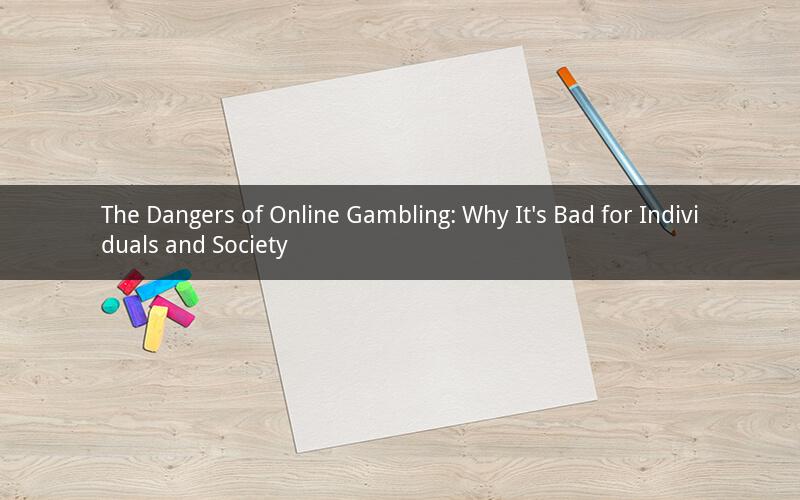
Online gambling has become increasingly popular in recent years, offering a convenient and accessible way for people to play casino games, bet on sports, and engage in other forms of gambling from the comfort of their own homes. However, while it may seem like a harmless pastime, there are several reasons why online gambling can be detrimental to individuals and society as a whole. In this article, we will explore the various aspects of online gambling and why it is considered bad.
1. Problem Gambling and Addiction
One of the most significant concerns associated with online gambling is the potential for problem gambling and addiction. The ease of access and the fast-paced nature of online gambling can make it difficult for individuals to control their spending and time spent on gambling activities. This can lead to financial problems, strained relationships, and a host of other negative consequences.
According to the National Council on Problem Gambling, an estimated 2-3% of the adult population in the United States is affected by gambling addiction. Online gambling platforms often lack the necessary safeguards and support systems to help individuals struggling with problem gambling, making it even more challenging for them to seek help.
2. Financial Risks
Online gambling can be a significant source of financial risk. While many individuals may start with the intention of playing responsibly, the allure of winning big money can lead to excessive spending and debt. The lack of face-to-face interaction and the anonymous nature of online gambling can make it easier for individuals to lose track of their spending and make impulsive decisions.
In addition, the use of credit cards and other payment methods can make it even more difficult for individuals to control their spending. Many online gambling platforms also offer promotional incentives, such as bonuses and free bets, which can further entice individuals to spend more money than they can afford.
3. Privacy and Security Concerns
Online gambling platforms collect a vast amount of personal information from their users, including financial and personal details. This information is often stored in databases and can be vulnerable to hacking and other cyber threats. Individuals who engage in online gambling may be at an increased risk of identity theft and other forms of fraud.
In addition, the lack of regulation and oversight in some online gambling markets can make it difficult for consumers to determine the legitimacy and security of a platform. This can leave individuals exposed to unscrupulous operators who may exploit their personal information for financial gain.
4. Negative Impact on Society
The negative consequences of online gambling extend beyond the individual level and can have a significant impact on society as a whole. The financial burden of problem gambling can lead to increased demand for social services, such as addiction counseling and financial assistance. In addition, the loss of money spent on gambling can contribute to economic instability and affect the broader community.
Furthermore, the rise of online gambling has raised concerns about the potential for increased crime and social problems. The anonymous nature of online gambling can make it easier for individuals to engage in illegal activities, such as money laundering and fraud.
5. Lack of Regulation and Oversight
One of the most pressing issues associated with online gambling is the lack of regulation and oversight. While some countries and regions have implemented laws and regulations to govern online gambling, many others remain unregulated. This can lead to a variety of problems, including the potential for exploitation of vulnerable individuals and the spread of illegal gambling activities.
In conclusion, online gambling is not without its dangers. The potential for problem gambling, financial risk, privacy and security concerns, negative impact on society, and lack of regulation and oversight all contribute to the reasons why online gambling is considered bad. Individuals should be aware of these risks and approach online gambling with caution.
Questions and Answers:
1. What is the difference between online gambling and traditional gambling?
Online gambling refers to the act of placing bets or playing casino games over the internet, while traditional gambling involves in-person activities, such as visiting a casino or betting on sports at a local bookmaker.
2. How can I tell if I have a gambling problem?
If you find yourself spending an increasing amount of time and money on gambling activities, neglecting your responsibilities, and experiencing negative consequences as a result, you may have a gambling problem. It's important to seek help if you suspect you may be struggling with problem gambling.
3. Are online gambling platforms regulated in all countries?
No, online gambling is not regulated in all countries. Some countries have implemented strict laws and regulations, while others have no restrictions or have weak oversight. It's important to research the laws and regulations in your country before engaging in online gambling.
4. Can online gambling lead to addiction?
Yes, online gambling can lead to addiction. The ease of access, fast-paced nature, and potential for financial gain can make it difficult for individuals to control their spending and time spent on gambling activities.
5. What can I do if I suspect someone I know has a gambling problem?
If you suspect someone you know has a gambling problem, it's important to approach the situation with empathy and support. Encourage them to seek help from a professional, such as a therapist or counselor, and offer to help them find resources and support.